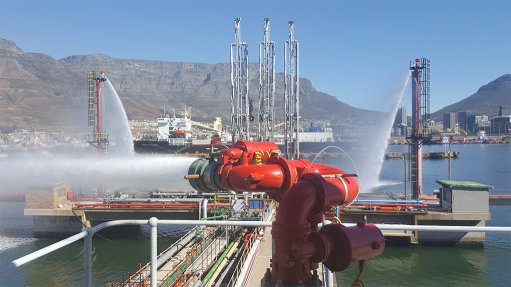
SAFE HARBOUR Flammable fuel is unloaded for bulk storage and handling at a bulk fuel offloading wharf, as DoseTech supplied a complete fire-protection system
Special fire-risk protection equipment supplier DoseTech has supplied a comprehensive fire-protection system to a new bulk fuel offloading wharf that is being built at the Port of Ngqura harbour, north-east of Port Elizabeth.
The system includes a foam dosing system and remote-controlled firefighting monitor systems.
In a harbour, a wharf is a facility that is built over water and supported by pilings, where boats can dock or be moored to load and/or unload cargo.
As a bulk fuel offloading wharf is a complex facility at which ships dock and unload flammable fuels for bulk storage and handling, the facility required a complete fire-protection system, says DoseTech MD Michael Feldon.
The foam dosing system consists of a German fire protection company FireDos stationary proportioner system, which uses foam as an extinguishing agent. To produce these extinguishing agents, the foam agent must be admixed to the water flow with high precision.
The admixing of foam and water involves the use of specially designed water motors and proportioning pumps that flow proportionally. This allows for the precise proportioning of the water and foam agent across a range of water flow rates and pressures.
The water motor is driven by the extinguishing water flow that passes through the motor that, in turn, drives the proportioning pump, which injects the foam agent into the extinguishing water stream proportional to the amount of foam required, explains Feldon.
The extinguishing water stream, now mixed with a foam agent, is then delivered to the extinguishing water pipework.
DoseTech also supplied its Conquest remote control monitor system, which is a firefighting monitor system that uses water cannons.
Conquest is ideal for use in industrial fire suppression, vapour mitigation and other fixed-site applications, particularly in petrochemicals-related applications.
The system uses remote-controlled water cannons that are operated from a control room. Feldon highlights that the control room would need to be placed where operators have a direct line of sight to the wharf facility; this enables them to suppress a fire by accurately aiming the water cannons at it, using a joystick.
“This water-driven technology is the latest in instrumentation and control process systems. With efficient design of the water cannon body, pressure losses and turbulence are reduced. This enables users to get optimum distance and performance out of the water cannons.”
The bulk fuel offloading wharf facility was originally expected to be commissioned by last month, with local construction company SA Five Engineering undertaking the construction of the facility.
However, Feldon highlights that the Covid-19 lockdown regulations, implemented in March, meant that construction continued only when people were allowed back on site in June once lockdown regulations had eased.
Consequently, the facility will be commissioned only towards the end of this year.
He also states that DoseTech supplied its fire protection system early this year, before lockdown regulations came into effect. Therefore, supply of this equipment, which was ordered last year and is manufactured in Europe and America, was unaffected.
Feldon adds that since the company has supplied the equipment to be installed by SA Five Engineering, DoseTech continues to offer technical support and assistance to and for the project.
“We offer a standard support procedure for all the goods we supply, with various levels of service contracts, depending on client preferences. Our services focus more on preventative maintenance measures, rather than repair,” he concludes.